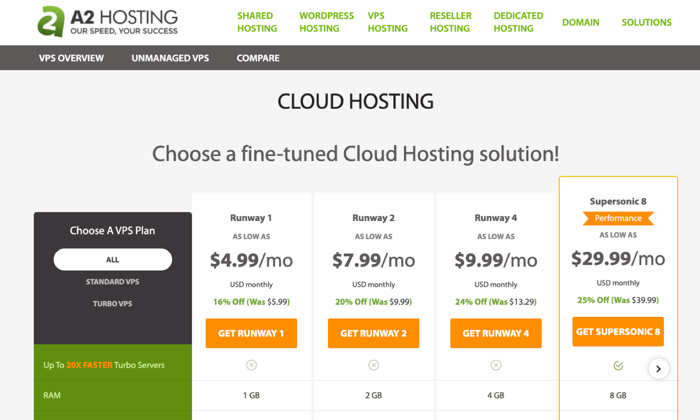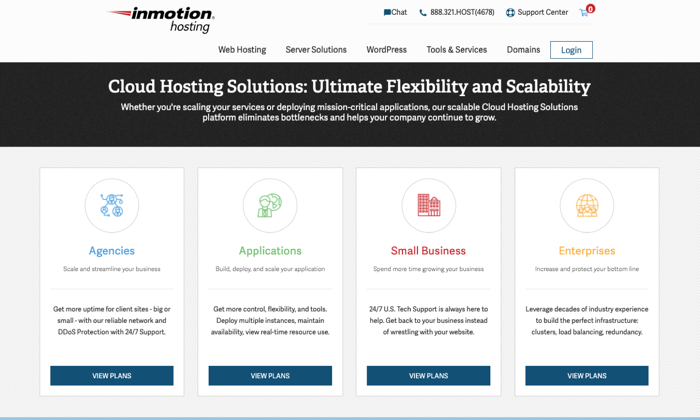
Disclosure: This content is reader-supported, which means if you click on some of our links that we may earn a commission.
You need a website that’s reliable, flexible, and adapts to your needs. You need to spend your time focusing on your business rather than worrying about your website.
Cloud web hosting could be the right choice for you. This is a relatively new kind of hosting that has emerged as an impressive solution for websites that need a stable and efficient, yet adaptable and agile hosting solution.
Unlike traditional web hosting, where you purchase a set amount of resources like bandwidth and RAM on a single server, cloud hosting spreads your website’s needs across a massive virtual server that lives on hardware in data centers all over the world.
With cloud hosting, it’s incredibly easy to add more resources or cut back as needed, and cloud hosting is much less vulnerable to equipment failure issues as there are many servers to pick up the slack.
If you’re looking for a cost-effective hosting solution to grow with your business, cloud hosting could be the way to go. Keep reading – we’ll break down 7 of the best cloud web hosting options and how to know which is the best one for your business needs.
The Top 7 Options for Cloud Web Hosting:
- A2 Hosting — Best For Speed & Flexibility
- Cloudways — Best User-Friendly Power Hosting
- Hostgator — Best For Affordability
- InMotion — Best Customer Support
- Bluehost — Best User Experience
- DreamHost — Best if You Know How to Code
- Nexcess — Best for Ecommerce
How to Choose the Best Cloud Web Hosting For You
With so many hosting options available, it can be overwhelming to figure out precisely what you need. With this in mind, here are a few specific factors to consider when choosing which cloud hosting service is the best option for you and your business.
Scalability
Perhaps the greatest advantage of cloud web hosting is its capability to grow with your business, whatever that looks like for you. For example, you might be launching an entirely new venture but have detailed plans to grow quickly and need a website that can easily scale with you. An alternate scenario would be a business with dramatic peaks and dips in traffic volume, like an online shop selling seasonal merchandise.
In both of these scenarios, you won’t want to be constrained to a set amount of resources on one single server, like you would in a conventional web hosting package. With cloud hosting, you’re sharing space with hundreds of thousands of other websites on many servers all over the world, so it’s quick and easy for your cloud hosting provider to add more resources to your plan as needed. Many of the providers we’ve included here make scaling up as easy as the click of a button.
Cloud hosting is the obvious choice if you’re planning for your business to expand quickly or if it often fluctuates significantly. But even in other cases, it might still be the right choice for you—keep reading to find out why.
Reliability and Security
One major plus to having your site hosted in so many different locations is security. Because your website’s integrity isn’t connected to a physical object (a specific, designated server), that object doesn’t need to be protected from harm. Public cloud hosting is formed by many data centers full of servers worldwide, and they’re generally highly secure and often in remote locations.
Furthermore, physical equipment fails and experiences issues. But because the servers that form the cloud can dip in and out of hosting your website, physical problems with a server you’re hosted on won’t impact your site’s performance.
Together, these two factors mean that many cloud hosting providers guarantee a really good amount of uptime, the time your site is online and working normally. Usually, they’ll guarantee between 99.95% and 99.99% uptime – but it’s often more.
So, if a website that functions extremely reliably and is secure from external threats is important to you, you’ll definitely want to go for cloud-based web hosting.
Cost Efficiency
Because cloud hosting means you’re taking up a tiny part of a tremendous amount of server space with many other tenant sites, the amount of resources you consume is extremely flexible. As we mentioned, your provider can easily scale up the amount of resources you’re using, but if you use fewer resources, you often only need to pay for what you consume.
In conventional web hosting plans, you’ll often end up paying for more resources than you use because you’re allotted a specific amount of server space, but with cloud hosting, that’s not a concern.
If this type of cost-efficiency is important to you, be sure to choose a provider from the list below who charges on a per-hour basis, rather than a flat fee.
The Different Types of Cloud Web Hosting
Whereas web hosting refers to hosting your site’s files on a single server somewhere, cloud hosting does not restrict you to a physical server. Your site is stored on multiple servers and offers far more flexibility, meaning that your site simply switches to another server if one is malfunctioning. Let’s take a look at the main types of cloud hosting.
Public vs. Private Cloud Web Hosting
The public cloud is one large cloud hosting service offered to thousands of different clients, or ‘tenants,’ by your cloud hosting provider. As you probably know, a public cloud is run from many servers all over the world. If you choose this option, even though you’re sharing the resources in the cloud with so many other websites, you aren’t sharing anything else like private data. Your provider will use security measures to ensure your data is kept confidential and separated from other tenants. It’s highly likely that public cloud hosting is the right option for you if you’re reading this article.
By contrast, a private cloud is hosted on specific hardware dedicated only to its one tenant. It’s more expensive and less efficient but may be the right option for businesses that need cloud hosting and deal with sensitive data where privacy is a huge concern. A private cloud can be created internally by the entity that needs it or offered by an external private cloud hosting provider.
A more recent innovation is the virtual private cloud, which combines many advantages of both options. Without getting too technical, virtual private cloud hosting embeds completely separate clouds, each hosting a different tenant, within a broader public cloud environment, or ‘intercloud.’
Managed vs. Unmanaged Cloud Web Hosting
When you opt for unmanaged cloud hosting, you’re basically just paying for the bandwidth and other resources your sites consume on their own, as a utility. You’ll be charged based on your consumption, whether that’s hourly, monthly, or another metric. Your chosen host is just providing the public cloud – almost always a public cloud – where your website is hosted, along with millions of others.
If you choose this option, it means you have the capability to handle the technical side of things in-house, whether your business is large enough to have an IT team or you’re a computer whiz who can manage it yourself.
On the other hand, managed cloud hosting brings in an element of customer service. The managed cloud hosting provider is doing some of the work of keeping your business online—work that, if you went the unmanaged route, you or your IT department would be taking care of.
In the past, managed cloud hosting was always private, making it more expensive and less scalable. Today, managed cloud hosting uses a virtual private cloud. This allows managed cloud hosting to bring the main benefits of cloud hosting in general—scalability and affordable pricing—to a managed model that’s a better fit for individuals and smaller organizations.
It’s essential to understand this distinction because all the choices on this list offer managed hosting options. Unless you’re a large-scale enterprise with a robust IT department or a technical genius, it’s unlikely unmanaged cloud hosting is the choice for you. So, keep that in mind when you’re shopping around.
#1 – A2 Hosting — Best For Speed & Flexibility
A2 Hosting tops out this list for several reasons. First of all, they’re known in the industry for super-fast web hosting, and their cloud hosting plans have proven to be just as fast and reliable.

What stands out about A2 is how adaptable they are. No matter what you want out of your cloud hosting provider, they are a good, solid option to get you where you need to go. 24/7 customer support is one feature that will be especially valuable if you’re slightly less tech-savvy. There’s also a variety of price points, with their cheapest plan, Runway 1, just $4.99 per month, and the most expensive plan, Supersonic 8, starting at $29.99 per month.
A2 Hosting also offers a 30-day money-back guarantee—something you won’t get from any other provider, so it really sets them apart from the competition.
Another notable thing about A2 is that you can host as many websites as you want, as long as you stay within the bandwidth you paid for.
#2 – Cloudways — Best User-Friendly Power Hosting
If you’ve got a large, complex website that needs powerful hosting, but enterprise-class solutions are out of reach, Cloudways could be a perfect middle ground.

Their cloud hosting comes from big providers that would usually only be accessible to big corporations but put it into an accessible format. Their simple dashboard makes using the service easy, and prices are on par with other entry-level cloud hosting options.
Cloudways also has servers in over 25 cities worldwide, and they let you choose which one yours is located in. That means you can select servers as close to your physical location as possible, which is good for your website’s speed.
When it comes to plans and pricing, even their least expensive plan, at $10 per month, comes with a lot of features, like 24/7 customer support, free SSL, free migration, dedicated firewalls, 24/7 real-time monitoring, auto-healing, and more.
#3 – Hostgator — Best For Affordability
If you’re looking for budget-friendly cloud hosting that’s still reliable, Hostgator is the way to go. Because it offers unmetered storage and bills on an hourly basis, it can also handle a site with a lot of pages or significant variations in traffic without sacrificing their great 99.99% uptime guarantee.

Their introductory discounts really set them apart, especially for their biggest plan. For your first year of hosting with Hostgator, you can get discounts of up to 70% depending on their deals. The Hatchling plan is currently $4.95 per month, with the Baby plan starting at $6.57 per month and the Business plan at only $10 a month after the discount. All plans come with a 36-month commitment.
Unless you choose Hostgator’s Business plan, you won’t get any perks like free backups or SEO tools, but that plan’s prices are still a great affordable option with the discounts. It’s also simple to use, including the ability to scale up your cloud resources as your business grows with just one click.
#4 – InMotion — Best Customer Support
InMotion is a fantastic option for small business owners who need a website, especially if they’re new to the digital world.

InMotion makes it easy to scale your resources as you need to, and the fact that their plans include a free SSL certificate and cPanel makes them a good one-stop-shop option.
But their customer service is what really sets them apart. InMotion offers 24/7 support via both live chat and phone, along with help tickets and a knowledge database with tons of resources to refer back to. If you’re a busy entrepreneur who’s not that comfortable yet online, this kind of high-support, all-in-one option is likely to be exactly what you need.
InMotion is a more expensive option with the lowest-priced plan for small businesses typically $59.99 per month. But at the time of this writing, they are running a sale, and this plan is $17.99 per month and still includes free SSLs.
#5 – Bluehost — Best User Experience
Bluehost is a very well-known name in the web hosting space. While most people know them for their non-cloud shared hosting plans, they actually offer the option to upgrade any of their plans to the cloud by choosing the CloudFlare option. This lets you bring the flexibility and scalability of cloud hosting to a simple, easy-to-use plan without making any changes yourself.

Bluehost makes building your site really easy. They offer WordPress plans, which is a platform many people are familiar with, as well as their own simple, Weebly-based website builder.
It’s a great way to bring cloud hosting advantages to a hosting and site-building experience that you might already be more familiar with.
The Basic plan starts at $3.95 per month but is only for one website. The Plus plan starts at $4.95 per month and has unlimited sites and storage. Choice Plus is their most popular plan and is $6.95 per month, while the Pro plan is $13.95 per month. All plan prices are for a 36-month agreement, and all come with 24/7 customer support, a free domain for one year, a free CDN, and a free SSL certificate.
#6 – Dreamhost — Best if You Know How to Code
Dreamhost is another great budget-friendly option, but it really shines if you already know how to code. Dreamhost is less expensive because you’ll need some technical know-how to really make your site your own.

If you’re comfortable managing and customizing your website through a command-line text interface, you’ll love Dreamhost – you’ll be able to keep playing around with the web development tools you’re already using. Even better, Dreamhost offers an unmetered hourly rate.
Dreamhost’s DIY ethos and low prices mean their customer support isn’t the most full-service, but if you’re in their target market, chances are that won’t be a deal-breaker.
Dreamhost plans start at $3.95 per month billed annually, and they have a lot of different hosting options to choose from. All plans give you a discount for annual billing over monthly payments.
#7 – Nexcess — Best for E-Commerce
Nexcess is a cloud hosting solution tailored to the needs of e-commerce businesses. They offer Magento, WordPress, and WooCommerce integration, making them a natural fit for selling products online. Paired with cloud hosting’s scalability, it’s the obvious choice for an e-commerce business with big plans to grow. They also offer a variety of plans depending on which e-commerce platform you choose, as well as 24/7 customer support—perfect for busy online shop owners.

Nexcess has many great features, including auto-scaling, PCI compliance, SEO tools, and a great deal of development tools for complete flexibility and customization.
Because Nexcess has so many integration options, it is difficult to give a specific price you can expect. However, as an example, if you choose WordPress as your platform, pricing starts at $19 per month for one site with 7 plan options. The most expensive option is the Enterprise plan at $999.00 per month and includes up to 250 sites, 800 GB of storage, 10 terabytes of bandwidth, 30-day backups, and unlimited email accounts.
WooCommerce has similar pricing to WordPress, but Magento starts at $49 per month for cloud hosting.
Conclusion
By this point, you probably have a pretty good idea of what your needs from cloud hosting are and which provider is the best choice to meet them.
It’s important to remember that while some options are better than others, there is no one-size-fits-all solution. You’ll want to be guided by your priorities, whether that’s cost, customer service, flexibility, or something else, and let that determine where you host. It’s a decision that could determine the future of your website. But with so many great options out there, the future is looking bright.
The post Best Cloud Web Hosting appeared first on Neil Patel.
About us and this blog
We are a digital marketing company with a focus on helping our customers achieve great results across several key areas.
Request a free quote
We offer professional SEO services that help websites increase their organic search score drastically in order to compete for the highest rankings even when it comes to highly competitive keywords.
Subscribe to our newsletter!
More from our blog
See all postsRecent Posts
- Web Hosting September 26, 2023
- Affiliate Management September 26, 2023
- Online Presence Analysis September 26, 2023

